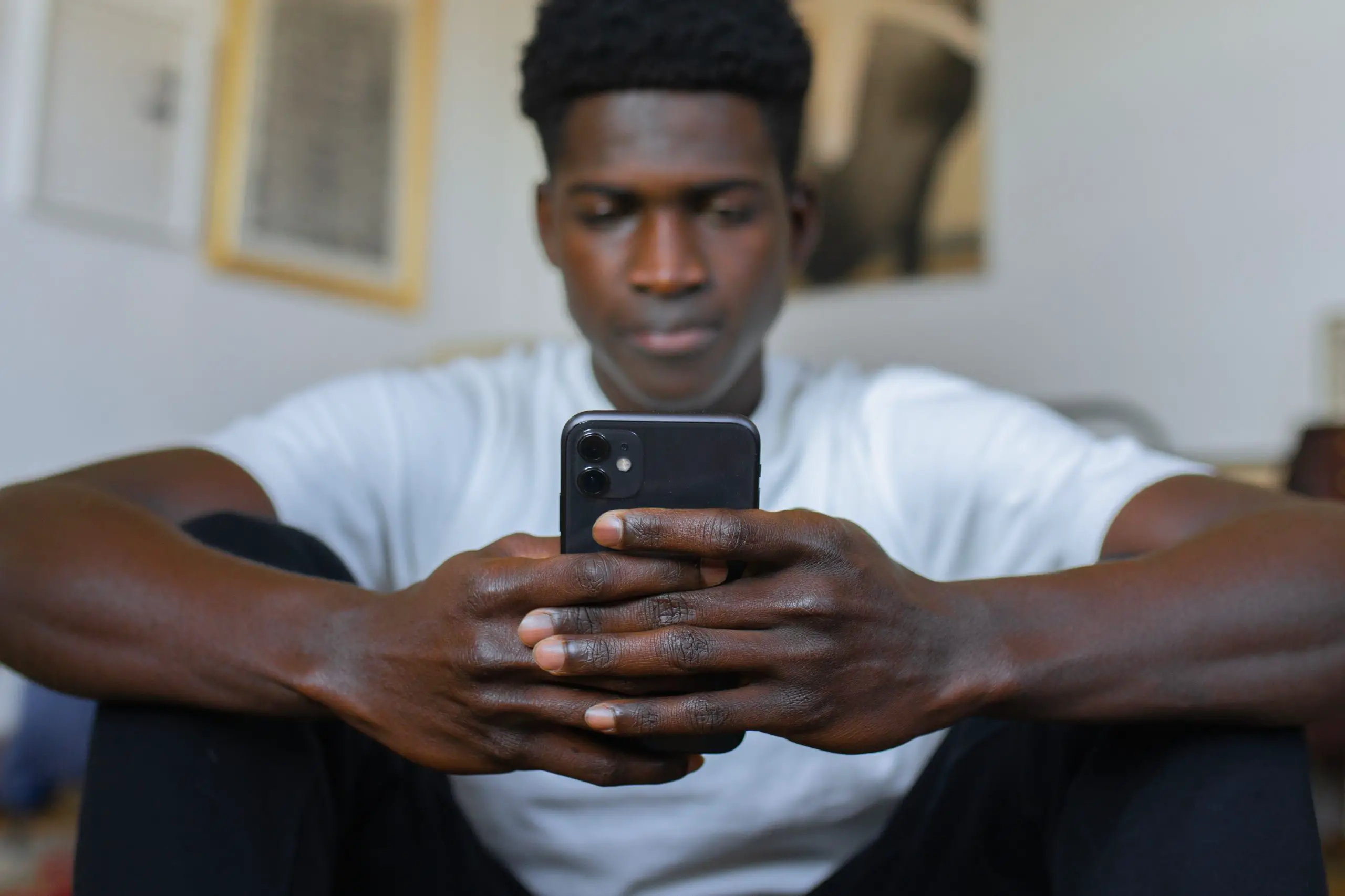Why Do INFJs Tend To Hate Social Media? (9 Pressing Reasons Why You Should Too)
July 24, 2022

Ever since the dawn of smartphones and the modern social media platforms, their effects on human behavior and mental health have been a controversial topic within public debate.
A typical INFJ is not a huge fan of smartphones and social media, because they’ve probably foreseen early on that a multitude of problems would arise from these quantum leaps into uncharted technological territory.
The INFJ is one of the 16 Myers-Briggs personality types, making up roughly 1-2 percent of the population. “INFJ” is an acronym which stands for Introversion (I), Intuition (N), Feeling (F) and Judging (J).
These four core characteristics describe the cognitive functions INFJs use the most to navigate through life.
Now to be clear, it depends which social media platforms you use, in which way you use them and how often.
Not everyone is the same.
Nonetheless, speaking as an INFJ male myself I reckon that a typical INFJ still might have a huge problem with social media and we’re going to dive into some of the reasons why that could be!
9 Reasons Why INFJs Tend To Hate Social Media
1. INFJs tend to hate social media, because it seems inauthentic
INFJs value authenticity greatly. They have a hard time tolerating fake or forced behavior in themselves and others.
Seemingly, the majority of social media posts only showcase the positive developments in a person’s life.
Many people only seem to post the luxurious vacations, career advancement, the new house, the new car, and other lifestyle upgrades.
Or people choose to showcase all of their good deeds for humanity, like how they’ve volunteered to build a school in some developing country, or how they’ve donated a pair of shoes to a homeless person, or how they are saving the world via their vegan diet.
Now, it’s wonderful that there are positive things happening in the world!
The question is why would someone only want to extensively document and broadcast that side of their life into the world?
The most important people already know at first hand about that person’s life’s successes and altruism, like their family, friends and the people they’ve helped.
Why intentionally start to record a video as you walk up to that homeless person to help them?
Could there be any ulterior motives here? Could this be moral grandstanding?
Furthermore, anyone who’s alive today for more than 15 minutes, knows for a fact that life isn’t all sunshine and roses.
That’s why the extensive documentation and meticulous curation of only the favorable events and virtuous acts in a person’s life on social media seem inauthentic to the INFJ.
Seeing that makes the prototypical INFJ want to take a shower afterwards.
2. INFJs tend to hate social media, because it seems to glorify and breed narcissism
It’s well-known that narcissists are the INFJ’s arch-enemy for numerous reasons.
No wonder the typical INFJ looks at social media platforms in horror, since these platforms seem to be a festival for narcissism (McCain & Campbell, 2018).
The countless airbrushed selfies, self-centered boastful posts/status updates, the incessant attention and validation seeking through the ceaseless pursuit of likes and comments, the never ending striving for a larger social media audience to broadcast to, and valuing people solely on their amount of social clout.
Looks like normal social media behavior right? But, you could ask:
Who cares about your tweet saying you are buying toothpaste RIGHT NOW at your local supermarket?
Who cares about your status update saying you’re so displeased that out of all trains, someone decided to jump in front of YOUR train, because now YOU are late for class?
Who cares about your cringey post by which you broadcast how touched you are by the 758 Facebook friends (you barely know), who wished you a happy birthday via Facebook?
Who cares about your online photo album called “The chronicles of my crazy little beautiful wondrous life” or any other pretentious title?
Who cares about your selfies with vinyl records in a record shop (even though you never bought or played a single vinyl record in your life)?
Who cares about you proudly and spitefully posting the complaint letter you’ve sent to your sexually active noisy neighbours on your Facebook wall for everyone to see?
Who cares about that Instagram story where you flex with how much fun you’re having with your friends at that exclusive party?
How could you record a TikTok video of yourself and your partner crying while breaking up your relationship in the hope for some likes?
Who cares about that haughty tweet saying you felt triggered by a violent scene in a Science-Fiction series called “Star Wars” and that you demand streaming services to provide you with a trigger warning for every “offensive” scene (which was kinda already in the title)?
Who cares about your 280 characters long layman’s Twitter thesis on every trending complex geopolitical issue?
Normal behavior within the social media sphere? Yes, but statistical normality doesn’t necessarily equal sanity.
The notion of writing a social media post, because you think it’s self-evident that the world is specifically waiting on an update on your mundane life and your extremely limited take on global warming is a peculiar proposition to say the least.
Now a little narcissism isn’t immediately a problem.
Yet, there seems to be a subtle slide towards the more problematic side of the narcissism spectrum over time when it comes to behavior on these social media platforms.
Of course, there are numerous people that have something to say and online discussions can have great social utility.
However, when the typical INFJ witnesses the display of mass glorification and breeding of inflated self-importance without any merit, it can’t help but shiver out of vicarious embarrassment.
3. INFJs tend to hate social media, because it exhausts them
A typical INFJ tends to be sensitive. In a significant amount of cases even highly sensitive, which is characterized by being very perceptive of subtle stimuli in their environments.
For instance, picking up the vague white noise sound of those old 80s television sets from a different room.
Or sensing subtle shifts in someone’s emotional energy.
This heightened sensitivity can be conducive to high quality intimate relationships as highly sensitive people often are good at sensing what their partners need.
The downside is that the heightened sensitivity is taxing, because when the nervous system picks up easily on sensory signals, it can also more easily be overstimulated.
A lot of INFJs struggle with this daily.
They carefully prevent becoming overstimulated as this leads to stress and exhaustion.
That’s why INFJs tend to stay away from social media.

Photo by Mikael Blomkvist on Pexels
The constant stream of scattered short-lived information, emotional impressions, frequent updates, intrusive notifications and the sheer volume of all that information in all its different possible formats at your fingertips can be overwhelming to the INFJ.
On average people spend 147 minutes (two hours and twenty-seven minutes) on social media each day.
That time isn’t all packed in one continuous session of course.
Time spent on social media is typically scattered throughout the day.
To be going back and forth from your daily activities to social media via your smartphone or computer and taking in all that ever changing information is exhausting to many INFJs.
To them it’s like pulling up with a car to 100 mph, hitting the breaks again and then pulling up again throughout their day.
So INFJs rather stay away, choose their social media platforms carefully or try to strictly manage their social media time.
4. INFJs tend to hate social media, because it depresses them
Many social media platforms function as a digital circus where everyone comes to perform their act for a large audience.
Like was mentioned before, everybody is doing their best to showcase a carefully polished image of themselves, to hopefully get some digital validation in return.
The amount of success, the glamorous lifestyle, the interesting activities, personal viewpoints, beliefs, the amount of high end social events they’re part of.
All of it is broadcasted into the world and everybody seems to compete by trying to trump each other or at least keep up with the Joneses.
To an average INFJ it’s a sad sight to see and a very depressingly phony one.
Because, in this strange game you automatically tend to compare yourself to the whole online world as a singular entity.
And because the online world is a vast place, you’ll always find someone who’s doing better than you in whatever area you value. So that means you can’t really win. Nobody wins.
If you’re caught up in constantly comparing yourself to others who are outclassing you like that, it’s inevitable to end up depressed sooner or later.
And the data seems to support this (Cataldo, Lepri, Jin Yeeh Neoh & Esposito, 2021).
5. INFJs tend to hate social media, because it seems to deteriorate the quality of human interactions
INFJs are all about high quality social interactions.
They make sure to communicate thoughtfully and respectfully, because they aim to create a harmonious social atmosphere that fosters authentic and open communication.
This is beneficial for all parties involved from the INFJ’s perspective.
Since the advent of smartphones and social media, the general quality of social interactions seems to be deteriorating.
You can see it all around.
Friends going for a coffee at a café, but looking through their smartphones in silence as their coffee gets cold.
Couples going out for dinner, sitting across from each other while both being on their smartphones for long stretches of time while eating.
Parents, having lunch with their baby at a restaurant.
Both parents sitting at the table across from each other looking down to their phones, while their baby is in the middle looking at them all confused in silence like a tennis match referee that’s impatiently waiting for a tennis player to begin their serve.
Youngsters with their ear-pods and smartphones having a FaceTime call with a friend while buying something at the grocery store, but continue the call while paying no attention to the cashier during the transaction as if it were a robot servant.
I used to have a friend who frequently complained about her best friend’s texting habits.
When they hung out, her best friend was frequently on WhatsApp texting other friends.
But when that best friend was with those other friends, she was frequently texting my friend!
In a sense, wherever she was, she wasn’t really there.
My younger Gen Z cousin told me she watches Netflix shows together with her friend while they both stay at their own homes (post pandemic).
Even though they live in the same neighborhood.
They discuss the show with each other via WhatsApp chat while watching it.
Now, to a typical INFJ all of the above would be blasphemous from a social etiquette perspective.
Granted that INFJs spend most of their time alone.
Yet, when they have set aside some time to meet someone, INFJs really want to give their undivided attention.
They’ll do their best to make sure the other person feels seen and heard.
That’s why INFJs tend to hate social media, because all around they notice a pattern of the negative effect it seems to have on the quality of social interactions they value so much.
6. INFJs tend to hate social media, because it seems to increasingly set a lower bar for content quality and achievement
INFJs very much enjoy quality products and services.
They don’t tend to be shopaholics, but when they decide to acquire something new they like for their clothes, gadgets and other personal items to be built to last.
The same goes for the content they consume.
As lovers of beauty, INFJs seek out content with a certain inspiring, deep and beautiful quality to it.
For example, a timeless literary work or a heartfelt podcast interview jam packed with wisdom they can revisit to savor every jewel inside.
In the last decade, social media and the growing online market and business space have proven their power to speed up people’s journey to success dramatically.
Where before the dawn of social media it took perhaps decades to build a profitable business or thriving artistic career, today you could achieve this within a year or two with limited resources all because of the boundless scalability the online world provides.
The power of going viral on these platforms with immense audiences launched many to instant stardom even.
An unparalleled development that has created countless great new opportunities and avenues through which people can make a living and change their lives profoundly.
Sadly, it simultaneously causes the masses to try to shortcut the road to success even more, which leads to fluff content, plagiarism, overpriced shallow online courses, uninspiring AI writer bot blog posts, lazy reaction video channels, sleazy marketing tricks and online shopping scams.
It’s hard to deliver high quality content if you just impatiently try to churn out as much “content” as possible for the sake of having content.
Luckily, there’s still enough good quality stuff out there if you look carefully enough!
But, when an average INFJ is looking for quality, unfortunately social media with its digital polluted seas full of empty worded e-books, and online deserts filled with heinous pyramid schemes, wouldn’t be their first thought.
7. INFJs tend to hate social media, because it seems to program the need for instant gratification
INFJs are renowned for their idealistic life goals.
High goals which might take at least a decade to achieve if not more.
By being so future oriented, INFJs don’t seem to mind making the necessary sacrifices in the present to reach that distant north star that glimmers faintly above the horizon.
A typical INFJ most likely developed strong mental muscles like self-discipline, self-control, self-motivation, perseverance, determination, diligence, visualization, strategic thinking and analytic prowess.
INFJs are like bodybuilders when it comes to their strong mentality and flex their mental muscles proudly in the metaphorical mirror.
They gladly receive and give respect to like-minded people, as those individuals understand what it means to hone those mental skills.
However, these mental muscles aren’t just for show!
Mental toughness is needed to reach their ambitious goals, which is characterized by delayed gratification.
Social media on the other hand is a place of instant gratification.
You can easily entertain and distract yourself with the easy digestible content social media provides for instant short-lived highs.

Photo by Cottonbro on Pexels
Clearly, it’s very addictive, because a lot of people seem to never get enough of it.
Whether it’s a stream of notifications or the next bizarre 10 second video, the idea of “the next thing” is intoxicating to many.
But once you’re stuck in that addictive cycle, you are like a lab rat compulsively pulling a lever for the next short-lived high.
This seems to be one of the reasons you see so many people glued to their smartphones.
Checking their smartphones every 5 minutes to see if there's an update, something new, the next thing.
Reacting to every incoming bleep, notification or update immediately, distracting themselves for hours scattered throughout their unproductive day.
Not being able to sit in silence somewhere for 5 minutes.
Always needing to be externally stimulated, wherever they are.
Allegedly, having attention spans similar to that of a goldfish.
Being bored easily and lacking any imagination, creativity or the ability to entertain oneself.
INFJs tend to be disgusted by this behavior, because they value self-control and self-reliance.
To be completely at the mercy of a smartphone device and the events on social media platforms is a weak mentality to them.
You’ll easily fall victim to whatever temptation presents itself to you.
You’ll be easily malleable by the powers that be and easy to sell useless products to.
On top of that, you won’t be able to achieve any meaningful goals, because you distract yourself all day and erode your self-control gradually.
Yes, INFJs are surely projecting and very judgemental here!
Yet, they can hardly stomach the degenerate mode of being that is considered normal these days.
8. INFJs tend to hate social media, because they are very private people
Public display of intimate parts of one’s life on social media, like pictures of family, birthdays, weddings, vacations isn’t a comfortable idea to most INFJs, simply because they are very private beings.
Knowing that many people know a lot about the INFJ’s personal life is a thought that can make INFJs anxious.
They could understand it if you share things on social media for business purposes, a project or to raise awareness for a certain cause.
But, to upload a lot of footage of your everyday life into the cloud where it stays permanently is a strange idea to them.
A loss of control, when people know too much about you is probably the underlying cause of the INFJ’s privacy.
In the end you also don’t know who’s watching you and for what reason.
9. INFJs tend to hate social media, because it enables toxic behavior
Have you ever walked down the street and started screaming, shouting and throwing insults at a stranger because you didn’t like their clothes, body shape or the type of groceries in their bag? No? Why not?
Probably, because you’re a decent human being.
Probably, because bystanders would judge you and cause your social reputation to decline in your community.
Probably, because the police would come and arrest you for disturbing the peace.
Probably, because you might get punched in the face.
In real life your negative or anti-social behavior usually has immediate consequences.
The dawn of the internet and social media platforms with the possibility to remain anonymous has changed that in a way.
Any vengeful, spiteful, cynical or miserable person can just log into an anonymous account on social media platforms and start to bully, insult, stalk or accuse people they despise for no apparent reason.
It might be because of opposing political views, it might be because they’re jealous of that other person’s success, it might be because they had a bad day.
Whatever it is, it’s immoral and they can do so with almost no consequences.
That’s why the comment sections of Youtube, Twitter and Facebook are infamous for being cesspools.
The empathic, polite and philanthropic INFJ sees this enabling of malevolent behavior, due to the structure of social media platforms and is repelled by it.
They rather stay away from witnessing all that toxicity or becoming a target of it.
References
Cataldo, I., Lepri, B., Neoh, M. J. Y., & Esposito, G. (2021). Social media usage and development of psychiatric disorders in childhood and adolescence: A review. Front. Psychiatry, 11:508595. https://doi.org/10.3389/fpsyt.2020.508595
McCain, J. L., Campbell, W. K. (2018). Narcissism and social media use: A meta-analytical review. Psychology of Popular Media Culture, Vol. 7, No 3., 308-327. http://dx.doi.org/10.1037/ppm0000137

INFJ Male
As a psychologist with a Master's degree in Clinical & Health Psychology, and as an INFJ male, highly sensitive human being, the author aims to blend the objective, subjective, mind, body and spirit for a holistic view on true well-being
for INFJs, Introverts, Highly Sensitive People and Empaths!
ALSO ON INFJ MALE PSYCHOLOGY

